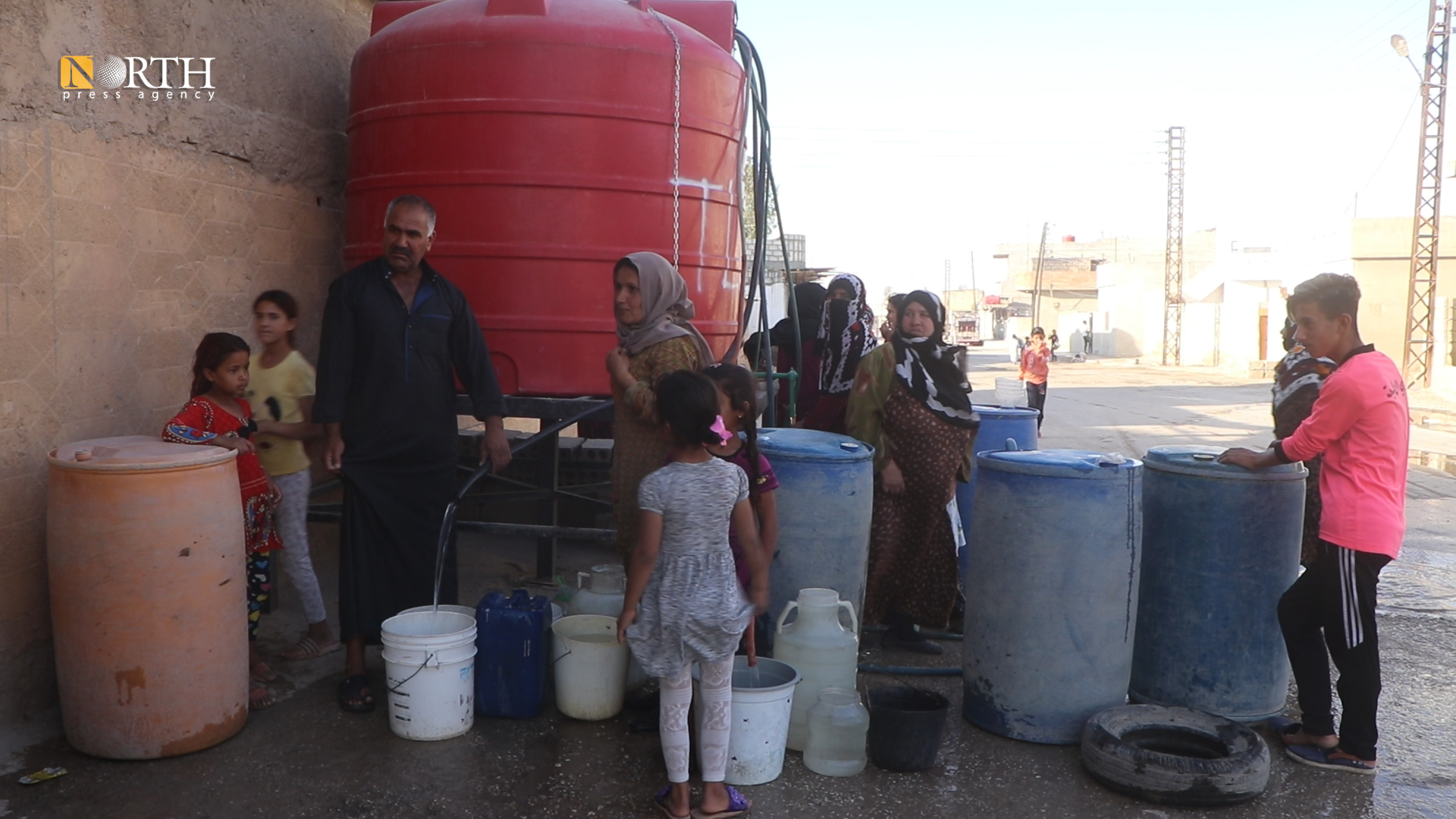HASAKAH, Syria (North Press) – Residents of the city of Hasakah, northeastern Syria, are digging wells in the city’s neighborhoods in order to secure water in light of the frequent water cuts from the main lines due to the lack of water supply from Alouk station in the countryside of Sere Kaniye (Ras al-Ain).
Since the Turkish invasion of Serekaniye in October 2019, Turkish forces and their affiliated armed opposition groups, according to officials in the Autonomous Administration, have deliberately not operated the Alouk station to their full capacity, and they also cut off water from the area dozens of times, and in some cases, the cutting continued for more than a month during summer of 2020.
The station is the main source of drinking water for the cities of Tel Tamr, Hasakah, Shaddadi, and Hawl with its countryside and its affiliated camps.
According to sources in the Autonomous Administration, despite feeding Sere Kaniye district with 20 megawatts of electric current in exchange for operating four pumps at a rate of 16 wells, the weak water pumping and the lack of water supply reveal the emptiness of the Turkish promises.
Earlier, a source from the Hasakah Water Directorate of the Damascus government told North Press that Turkish forces are demanding more electricity for their areas of control in exchange for operating a specific number of water pumps.
Less than 10%
Sozdar Ahmed, the co-chair of the Water Directorate in Hasakah, said “The station is not operating at its full capacity; the power is estimated at less than 10% of its total.”
“It operates ten wells out of 34, and one or two of the eight pumps,” Ahmed Added.
She further explained “The amount of water received from Alouk station to the main reservoirs in Hasakah is estimated at about 10,000 m³ per day, while the city’s needs exceed 70,000 per day.”
“There is a severe shortage of water coming into the city.The capacity of the main reservoir in the city is 30,000 m³.This means we need from 3 to 4 days to fill the main reservoir and pump the little water we have,” she concluded.
The water pumped to the city’s sectors covers only 30 percent of the population’s needs, according to Ahmed.
Recently, well-digging mechanisms are spreading in the streets of Hasakah neighborhoods, as residents rely on buying drinking water from mobile tanks, at prices of about 8,000 Syrian pounds (SYP) for each five-barrel tank.
Hasakah residents face a problem that the water from most wells is not suitable for drinking, as they are forced to use it for cleaning and other household needs.
Undrinkable water
Yahya Hamy, co-head of the Water Department in the city of Hasakah, considered the big trend to drill wells a bad phenomenon, as well’s water is polluted and undrinkable.
“Water shortage pushes the residents to dig wells.There are conditions for those wishing to drill wells.It must be in the neighborhood garden or in the yard of the house.We forbid digging in the streets. There are laws that cannot be bypassed,” Hamy said.
The cost of a license to drill a well is 15,000 Syrian pounds, according to the Water Department.
Abdullah Salem, owner of an excavator from the city of Kobani, said that the depth of the well ranges between 30 and 50 meters, as each meter is drilled for 10,000 SYP.
Salem indicated that there is a great tendency to dig wells “We work 24 hours. The people are without water.They all ask us to dig wells for them.The water is salty and undrinkable. People are forced to dig wells .Well water dries up quickly and is not suitable for many uses, but they have no better choice.
The suffering of the residents is exacerbated by the advent of summer, the rise in temperatures and the consumption of greater quantities of water, as the city is divided into five sectors, and water reaches each sector approximately once every 15 days, lasting less than ten hours in many cases.
As a result of the poor pumping and the lack of incoming quantities, there are neighborhoods in Hasakah that are never reached by water. Also, pumping periods sometimes coincide with power cutoff, which prevents the tanks from being filled, according to local residents.
Ahmed Jaber, resident of Tala’a neighborhood in Hasakah, said that they didn’t receive water through the main water pipes years ago, as they are forced to buy water from tankers.
“There is no water in the entire neighborhood. We buy water from water tankers for 7,000 or 8,000 SYP according to the quantity.Most of the time we drink well water,” Jaber said.
Regarding the possibility of communicating with the Public Establishment for Drinking Water in Hasakah and allocating them to tankers to deliver water to areas that the pump never reaches, Jaber indicated that they submitted a request and a complaint and received only promises from the authorities.
However, the co-chair of the water directorate in Hasakah, said that the number of tanks belonging to the Directorate is not enough to cover the needs of homes that do not have access to water.
Two years ago, water did not reach the house of Fawaz Hussein, a resident of Azel neighborhood in Hasakah, through the main lines, “We have not had tap water for more than two years.”
Hussein pointed out that the pumping of water to their neighborhood comes every 20 days. Most of the houses cannot fill their household tanks because of the poor pumping, “When they start pumping the water, if we manage to fill our household water tank, it’s okay. Otherwise we remain without water.”

